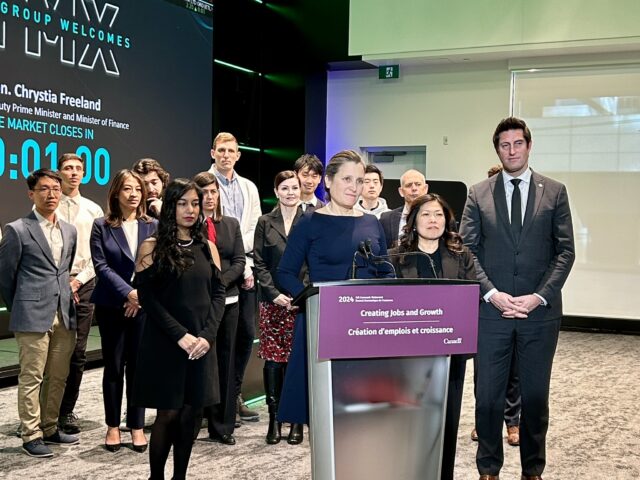The federal government is promising billions in new incentives to fuel Canadian innovation and economic growth, as outlined in the 2024 Fall Economic Statement unveiled today by Deputy Prime Minister and Finance Minister Chrystia Freeland. Speaking alongside International Trade Minister Mary Ng, Freeland announced sweeping reforms designed to boost business investment, expand Canada’s innovation sector, and strengthen domestic pension fund involvement in the economy.
At the heart of the plan are changes to the Scientific Research and Experimental Development (SR&ED) tax incentive program, a cornerstone of Canada’s innovation strategy that currently supports more than 22,000 businesses. The reforms will increase the generosity of the program, particularly for high-growth firms, and are expected to deliver $26 billion in tax incentives over the coming years.
Key measures include raising the annual expenditure limit for enhanced investment tax credits from $3 million to $4.5 million and increasing taxable capital thresholds for eligibility. The government will also restore eligibility for capital expenditures under the program and extend refundable tax credits to public corporations for the first time.
“The fight for capital has never been more fierce,” Freeland said. “Canada needs to fight harder than ever to attract and retain investment. These reforms are designed to ensure Canadian innovators have the tools to discover the next breakthroughs here at home.”
The government is also setting its sights on unlocking billions in private-sector and pension fund investments. Freeland described a suite of proposals aimed at creating a more attractive environment for pension funds to invest domestically, including lifting the 30 per cent ownership cap on Canadian entities and launching a new $1-billion round of the Venture Capital Catalyst Initiative. The plan also includes $45 billion in loans and equity investments for AI data centres, with the goal of solidifying Canada’s leadership in artificial intelligence.
These reforms come as Canadian pension funds, which hold more than $3 trillion in assets, continue to invest heavily abroad. The government is aiming to reverse that trend by removing barriers and offering incentives to bring more of those investments home.
“At a time of rising economic nationalism, it is crucial that Canada fosters a competitive and innovative domestic economy,” Freeland said, highlighting AI as a key area for investment.
The Fall Economic Statement also proposes up to $1 billion in concessional financing for mid-cap companies and incentives for developing airport lands, a move that aligns with broader efforts to attract private capital into infrastructure and development projects.
Economists have long criticized Canada’s sluggish productivity growth and lagging business investment. With these new measures, the government is signaling a renewed focus on positioning Canada as a leader in innovation while addressing barriers to growth.
The 2024 Fall Economic Statement will be tabled in the House of Commons on December 16. It follows a decade of steady growth in Canada’s venture capital ecosystem, which reached $6.9 billion across 660 deals in 2023, up from $1.9 billion a decade earlier.
Whether these bold reforms will deliver the intended economic gains remains to be seen, but they underscore Ottawa’s belief that a more competitive and innovative Canada is essential for long-term prosperity.
Photo: Chrystia Freeland X





































